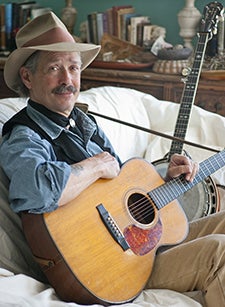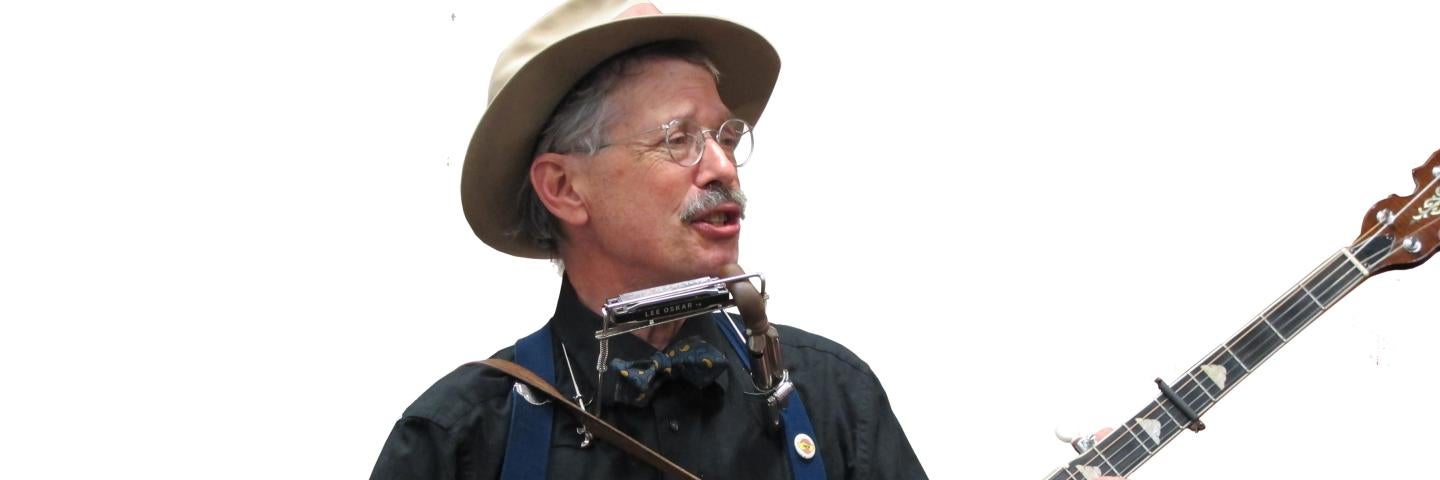 | Traditional skill/art/craft: Folk and Old-Time Banjo Years Awarded: 2012 Contact Information: Phone: (541)343-5127 Email: borle17@gmail.com |
ARTIST BIOGRAPHY
I started playing guitar when I was 14, in the midst of the Folk Music Revival of the ’60s. The commercialization of the music that was presented as “folk” provided those of us who wondered where all these magnificent sounds came from with the incentive to find their origins. In 1967, I found myself in Greenwich Village, trying to make a living singing folk music. I met a number of the traditional musicians whose recordings I had been listening to. I spent many months absorbing those lessons from musicians such as Kenny Hall, Jody Stecher, Pat Sky, Dwayne Storey, Dave Van Ronk and Larry Hanks. In 1970, I moved to the Bay Area in Northern California, where I started to play traditional string band music, busking in a string band with Dave Polacheck (winner of the 1971 Topanga Banjo Contest), and with Clarke Buehling (who has become one of the leading exponents and practitioners of 19th-century banjo styles).
I moved back to New York City in ’72 to be a folksinger-in-residence at the New York Folklore Center. I helped book and produce the concert series and wrote the monthly newsletter. Surrounded by superb musicians, I started to learn other instruments: banjo, harmonica, fiddle, mandolin, dobro, dulcimer, and autoharp. In 1976, while touring the Midwest, I moved to Kansas. In 1978, I moved to Montana where I lived for 23 years in Missoula and Butte. I played folk music in schools, bars, clubs, festivals, and hobo jungles. I taught banjo and guitar. I performed live radio shows for Montana Public Radio, which broadcasts through Western Montana. I toured with my mentor, U. Utah Phillips, as his sideman and opening act. Ten years ago, I moved to Eugene, now my base for local regional and national concerts, clubs and festivals. I present weekly programs at pre-schools; and teach banjo, guitar, fiddle, dobro, mandolin, harmonica and autoharp.
APPRENTICE BIOGRAPHY - Emma Trank 2012
Emma Trank first learned this art form when she a child, her mother would play bluegrass and banjo music on the stereo for her. She started taking lessons to learn the banjo when she was ten and has worked with Mark Ross as her teacher for the last seven years. For this apprenticeship, she wishes to expand the way she plays and her understanding of banjo music. Trank feels that “Mark lives in the music” and that it makes him a good teacher.
Q+A WITH THE MENTOR ARTIST
Describe your traditional art.
Body
Old Time 5-string Banjo is the first popular American musical form dating from early in the 19th Century. An evolution of the instrument African slaves brought to the New World. It is played for dances to accompany ballads to drive away the blues. It is a rich tradition with many different roots in American popular music, classical music, African-American tradition and mountain culture.
I first heard the banjo when I was 8-years old and heard Pete Seeger play with The Weavers. I took up the guitar and started playing American vernacular music in the height of the GREAT FOLK MUSIC SCARE of the 1960’s. I’ve been playing the banjo for forty years, and have played with Snuffy Jenkins, Tony Trischka, Marty Cutler, Hank Sapoznik, Stephen Wade, and Ken Perlman.
Why is this cultural tradition important to your community?
Body
During the 19th century when the banjo was perhaps the most popular instrument in America, it dominated the music of the south. A large proportion of the people who settled in Oregon were from the south, Kentucky and Appalachia. They brought their music with them perpetuating southern 19th century banjo styles. As the banjo died out in other sections of the country, it remained part of life in remote enclaves throughout the South and in areas where southerners had settled, including Oregon. It also continued to be a key instrument in labor and hobo songs.
Experience/Honors
Body
I was nominated for an INDIE Award (National Association of Independent Record Distributors) for my work with Utah Phillips on his Red House recording LOAFERS GLORY (1996). I was privileged to be part of a Grammy nominated compilation SINGING THROUGH THE HARD TIMES: A Tribute to Utah Phillips (Righteous Babe, 2009). I have appeared at the Philadelphia Folk Festival, Vancouver Folk Festival, Winnipeg Folk Festival, Smithsonian Festival of American Folklife, and numerous other venues including colleges, coffee houses, concert halls, honkey tonks, hobo jungles, and other low dives. I’ve also recorded for Sesame Street, National Public Radio, and hosted a live public radio folk music show on Montana Public Radio for six years.
I have appeared at the Smithsonion Bicentennial Festival of American Folklife, the Philadelphia Folk Festival twice, the Winnipeg Folk Festival, the Vancouver Folk Festival, the Champlain Valley Folk Festival, The Peoples Poetry Gathering, and the Old Songs Festival in Altamont NY as well as at numerous clubs, colleges, public schools and senior citizen centers.
Songs I’ve written have been recorded by Utah Phillips, Jim Ringer, Sawyer Tom Hayden, Horse Sense, and Tom Perlman. I have shared stages all over the country with Utah Phillips, Rosalie Sorrels, Jim Ringer, Jerry Jeff Walker, Pete Seeger, Arlo Guthrie, Earl Robinson, Faith Petric, Anne Feeney, The Rose Tattoo, John Hammond Jr., David Bromberg, Steve Goodman, Paul Siebel, Mike Seeger, Brownie McGhee & Sonny Terry, and Ramblin’ Jack Elliott, among others.
Visit OFN's Culture Keepers Roster to learn more about the artist.
Traditional Arts Apprenticeship Program
More OFN programs
OFN main page
